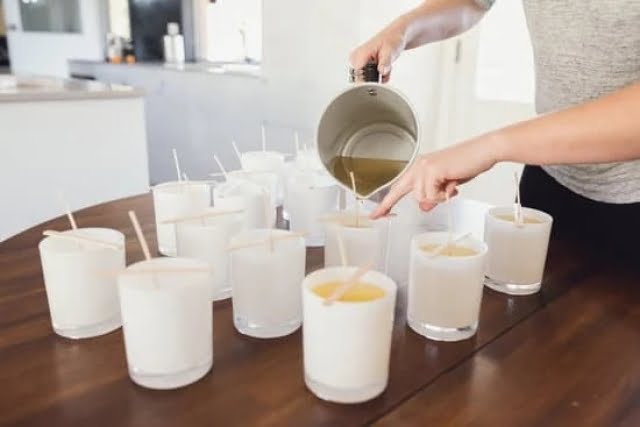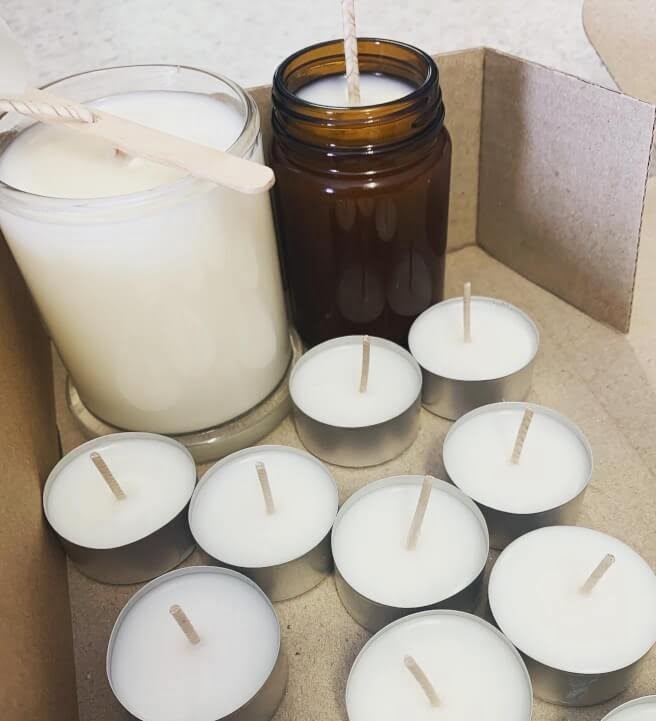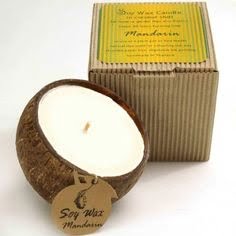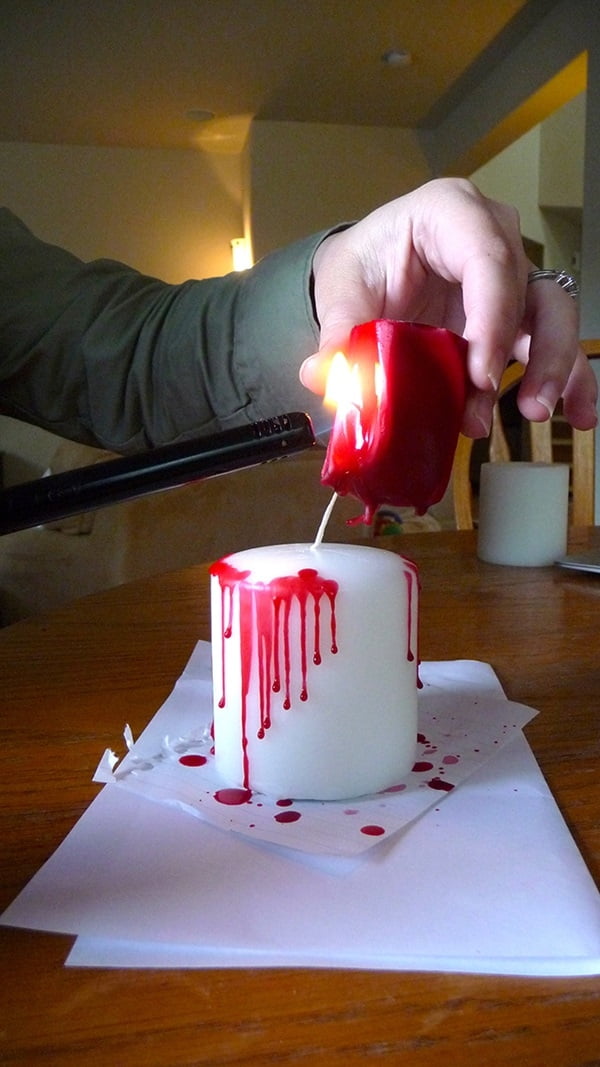Fragrance oils are perfect for candle makers, as they provide a unique and strong aroma. For this reason, it is essential to choose the best fragrance oils for making candles. Aroma molecules in these oils evaporate slowly when exposed to heat, providing an interesting and powerful scent that makes candles even more attractive.
Fragrance oils also give the opportunity to customize candles according to specific needs; one can mix various types of scents to create something new and unique. Additionally, this type of oil can help preserve colors and ensure a stable texture in addition to boosting their burning time.
When selecting fragrance oils for making wax candles, one should consider the type of wax they are using since this will provide insight on which ones would be ideal for their particular needs. Soy waxes are more delicate than paraffin waxes and require low flash points below 200F while paraffin-based fragrances can tolerate temperatures up to 300F.
In addition, essential oils should be tested first before adding them into any product; this allows one to determine if they like the smell or not before starting the candle-making process in its entirety.
These high-quality fragrance oils come with amazing benefits that can take candles’ power and make them even better options popping with scents both indoors and outdoors environments. Oils bought from professional brands offer increased clarity of smells along with balanced complexity between top notes, midnotes, and base notes differentiating each scent’s characteristics in its own way so first-time users don’t have to worry about creating something sensory unpleasant unknowingly.
In other words, commercial-grade fragrance offers more safety due to standardized packaging accompanied by knowledgeable guidance aiding those learning new methods or even expanding their knowledge further within candle making field if needed.
Details of How to Best Use Fragrance Oils in Candle Making
Fragrance oils are a popular ingredient for candle making, as they help to create beautiful scents when finished. There are many different types of fragrances and some work better than others. To effectively use fragrance oils for candle making, start with a little research. Here are some tips to consider when choosing the best fragrance oil for your candles:
- Determine Your Desired Scent – Before you even begin researching fragrance oils, it is important to decide what kind of scent you want in your candles. Popular fragrances include floral, woodsy, citrusy, herbal, and spicy.
- Choose Quality Oils over Budget Options – It’s important to consider the quality of the fragrance oils that you buy. Premium grade blends specifically designed for candle-making will impart bright and lasting scents to the wax.
- Have Fun With Blending Fragrances – Many experienced candle makers enjoy experimenting with combining different oils to create unique scents. For instance mix lemongrass, lily of the valley and primrose blossoms for a springtime scent or red raspberry leaf with freesia for an autumnal aroma.
- Check Flash Point Ratings – When using fragrance oils, it is vital to know their flash point as this determines how much heat can be used before the oil will evaporate into smoke. If you exceed this temperature with your wax mixture, you may lose some of the scent.
- Calculate Fragrance Oil Load – Take note of how much fragrance oil is added to each pound of wax being used as too high a load may result in candles that do not burn correctly.
When trying out these tips with fragrance oils in candle-making it’s essential to practice safety first. Make sure all ingredients are stored away from children and pets, and when working with hot wax make sure there is plenty of ventilation available.
Maintain workplace safety by wearing protective goggles and avoiding direct contact between any heated objects such as containers or measuring spoons and skin. Lastly never leave hot wax unattended – always keep an eye on your produciton process from start to finish.
Highlights of the Various Types of Candle Fragrance Oils Available
Fragrance oils are a crucial part of making candles. They bring out the aroma and create an atmosphere that will make the best of any home.
Fragrance oils can be categorized based on their composition and strength:
- Essential Oils: Typically derived from natural sources, these oils have strong, concentrated aromas. They are more expensive but offer a wider range of scents than artificial fragrances.
- Synthetic Fragrance Oils: These usually contain synthetic aromatics made from natural or synthetic ingredients. While they are often less expensive, they do not have the same range or intensity as essential oils.
When it comes to selecting the right fragrance oil for your candles, one should consider three primary considerations: intensity, base note, and top note. Intensity refers to the strength of the scent when heated; showing how much of the oil needs to be used in order to achieve the desired level of olfactive power.
Base notes provide support and anchor the scent down while top notes act as a lighter component that delivers immediate impact with subtle nuances revealing themselves upon burning.
Amongst other fragrance oils based on their various compositions, vegetable-derived waxes are slowly becoming popular when it comes to candle fragrances due to their allergenic benefit; without containing petroleum byproducts such as Pthalates. Soybean wax is widely preferred due to its affordability and easy availability compared to other vegetable-based waxes such as bayberry and palm waxes.
It also burns cleanly producing less soot buildup over time and giving off a pleasant scent when burning. When shopping for soy-candles it is important to ensure that they are made using 100% pure soybean oil for optimal scent results.
Sandalwood has gained consistent popularity amongst candle makers due its lovely warm aroma with smoky undertones which works perfectly in both scented and unscented candles especially during fall season when it lets off its woody and smooth notes into the air whilst filling any room with peace and comfort no matter how small or large it may be.
Overview of the Advantages of Candle Fragrance Oils
Fragrance oils are essential for making high-quality candles as they give off a scent that can be smelled for long periods after they have been lit. Fragrance oils in candles have many advantages, including the ability to mix and match scents to create unique odors and aromas, which can be tailored to the customers’ tastes and preferences.
Additionally, fragrance oils typically last longer than natural scents, making the candle lasts longer too. Furthermore, when compared to natural scents, synthetic fragrance oils are much more affordable.
Types of Candle Fragrance Oils
There is a variety of different types of candle fragrance oil available on the market today. The most popular type is paraffin wax-based fragrances which use a combination of pure paraffin wax and other ingredients such as essential oils or fragrant compounds. This type of oil tends to provide a strong scent that can last in the air for hours after the candle has been lit.
Other options include soy wax based fragrances which are made from pure soy wax combined with added fragrant compounds; these provide a light yet pleasant scent that also lasts long after the candle has been extinguished. Another option is vegetable wax-based fragrances which use a combination of beeswax and vegetable-based ingredients in order to create an allergen-free product with minimal impact on the environment.
Precautions When Working With Candle Fragrance Oils
Before using any type of candle fragrance oil, it is important to take safety precautions since some fragrances may irritate skin or produce toxic fumes when heated or burned. Additionally, fragrance oils should not be ingested under any circumstances as this could lead to serious health issues such as vomiting or even death in extreme cases.
It is important to consider ventilation when using fragrance oils since there can be noxious gases released during burning; also do not leave unattended candles smelling burning as this could lead to injury or property damage from fires caused by unattended flames or leaking waxes onto nearby surfaces.
Finally, ensure that you research recipes recommended by professionals before attempting DIY designs as incorrect applications may lead to decreased performance overall due to inadequate combinations of ingredients used together; always test small batches before committing larger orders also.
Expert Advice on Choosing the Best Fragrance Oils for Your Candles
When selecting a fragrance oil for your candles, it’s important to consider the type of candle you plan on making. Fragrance oils can be categorized into two main categories – natural and synthetic.
Natural oils are derived from plants, flowers, fruits and other organic sources while synthetic oils are made in a laboratory with chemicals and compounds combined to produce various fragrances. Each type has its own benefits and drawbacks so it’s important to consider your needs before making your decision.
Benefits of Using Natural Oils
There are many advantages to using natural fragrance oils when creating candles. The most obvious benefit is that these oils bring a more natural aroma than the artificial scents created by synthetic alternatives. Due to their unique aromas, natural essential oils can create spectacular scented candles capable of transporting you away from reality into an olfactory paradise.
When used at the right concentrations, these oils won’t discolor or burn out quickly like synthetic versions would become overpowering very quickly because of their strong impact on the airwaves. Moreover, as they don’t contain any harmful additives, they allow extra freedom when working with additives such as colorants and waxes which can affect the burning properties of other types of scent oil in a negative manner.
Benefits Of Synthetic Fragrance Oils
In addition to being cheaper than essential fragrances, creating a scent with synthetic fragrance oils eliminates the need for finding hard-to-source essential ingredients found in nature. Because these ingredients are specifically designed for applications like candles, you’ll have less difficulty dealing with their burn or discoloration characteristics; however, some fragrances do evaporate faster than their natural counterparts due to their more complex chemical composition.
Finally, most artists opt for this type of fragrance due to its ability to produce clean scents without any side notes or extraneous odors present during the burning process which can be quite unpleasant if not handled properly/
Factors To Consider When Choosing A Fragrance Oil
When trying to pick between natural vital oil and synthetic scents for making candles bear in mind that there is no one-size fits all solution since each person’s individual goal may differ from one project to another.
However some factors should still be taken into consideration prior committing yourself to either options: how much money you want invest on ingredients; how long you wish your fragrance feature should remain noticeable; what particular action do want it yield when lit (i/e how its smell spread through environment).
In order for optimal results use only top quality products approved by health authorities regardless which option is chosen – this will ensure high standards at all times avoiding risk overlooking miscellaneous issues related usage substandard resources didn’t pass adequate testing requirements.
Several Steps for Identifying Quality Candle Fragrance Oils
Fragrance oils are a special and an important element in making candles. Some common types of fragrance oils for candle making include floral, bakery, fruity, marine related (ocean/beach), coffee, herbal/spicy, musk/woodsy, and seasonal scents. When selecting a fragrance oil for your candles it is important to make sure you find quality fragrance oils that will give the desired aroma being sought after. Here are some steps to consider in identifying high quality fragrance oils for candle making:
First, be aware and informed of regulations concerning ingredient use in products used by humans. Make sure the fragrance oil that you are using contains ingredients approved by regulatory agencies or certified as vegan with no animal products or testing involved.
These can generally be found right on the label of the product or bottle. This will guarantee that you only use premium grade fragrances free from any contaminants or byproducts harmful to humans such as phthalates and other synthetic compounds.
Second, consider researching online about these particular fragrance oils such as reading customer reviews of specific brands to see how well they perform and smell when burning in a candle situation. This can help drastically narrow down which type of fragrance oil would work best for your particular needs without wasting money on potentially inferior products.
Lastly, use testers to identify which scent works best as each person has different preferences when it comes to aromas so choosing one by nose alone may not always yield desirable results.
There are testers available online which allow users to sample many types of fragrances at once so this can help quickly determine unliked smells before having to purchase larger sizes bottles and risking buyer’s remorse if it’s does not meet expectations or needs in quality characteristics or aroma strength required.
Be sure take note favorite scents after testing them so there is no confusion later on when ordering them in bulk packaging following all test trial runs being effective completed.
What Not to Do When Shopping for Candle Fragrance Oils
When shopping for fragrance oils for use in candles, it is extremely important to make sure that the quality of the fragrance oils is high. This will ensure that your candle not only smells great, but also has a good burn time and does not produce any harmful fumes or smoke.
Here are some of the things you should avoid when purchasing fragrance oils:
- Buying low-grade fragrance oils: Low-grade products often contain impurities which can affect the scent as well as burn time. Additionally, these oils may emit foul odors during burning.
- Not checking expiration dates on labels: A label must include an expiration date for any product containing fragrances.
- Using fragrances created for other purposes: Fragrances designed for body care items and skin products are usually not suitable for candles.
It is important to do your research before buying. You should read reviews online from customers who have used the same product, and you should look at safety data sheets to make sure that the manufacturing processes used are up to today’s standards.
Additionally, if possible, it is always recommended to test a small amount of the product before committing to a larger purchase. By understanding exactly what it is you’re looking for and what you want your candle to smell like, you will be more likely to find a quality product that will meet all of your needs.
Another factor to consider when shopping for candle fragrance oils is cost. Many companies that specialize in selling fragrance oils often offer lower prices than retail stores or large chain stores due to their ability to buy bigger bulk orders of higher grade materials directly from manufacturers. Be sure to check different websites and determine which one offers the best price while still providing products of top quality.
Showcase of Three of the Best Fragrance Oils for Making Candles
Fragrance oils are a great choice for making candles. From calming scents to the sweet smell of strawberries, these oils can be used to create unique and delightful candles with beautiful fragrances. Choosing the right scent for your candles can seem overwhelming due to the many scent options available. Here is a showcase of three highly recommended fragrance oils that will help you make special and stunning candles.
The first highly recommended fragrance oil is citrusy lime. With its subtle yet refreshing aroma, this oil can bring a zesty twist to any candle, making them perfect for purifying or refreshing an environment. Citrusy lime is especially great for creating citronella-scented outdoor candles, which will keep away bugs and mosquitos naturally and without harsh chemicals. Other than using this fragrance oil in outdoor activities, it also adds an uplifting twist to brighten up any space when burned indoors.
Next up is cherry blossom-a light and airy scent with delicate notes of citrus and sweet floral aromas that will fill any space with charm. As one of the most beloved fragrances, cherry blossom is an ideal choice for those looking for a gentle but captivating scent in their candles without being too overpowering or overly strong.
Perfect as gifts or simply to brighten up your own space, this classic fragrance adds a touch of elegance and serenity to any candle so that it feels like spring all year round.
Lastly, we have Vanilla Bean-a timeless classic which offers cozy warmth in every candle it’s used in – it’s no wonder why vanilla remains one the most popular scents around. One great way to bring out the sweetness of its aroma is by creating signature double-scented vanilla bean candles with subtly-scented accompaniments such as honeycomb or maple buttercream – bringing together two complementary aromas can create some truly decadent combinations.
Vanilla bean also pairs exceptionally well with other fragile notes both sweet & savory so it really comes down to personal preference.
Those were three highly recommended fragrance oils that are perfect for crafting custom candles – each provides something special depending on what kind of scent you’re looking for & every single will guarantee an experience that’s different from all others. Whether you prefer invigorating citrusy notes or something more subtle & earthy like vanilla bean – there’s plenty choices when making scented products so let your creativity do the work & have fun exploring different possibilities.

Welcome to my candle making blog! In this blog, I will be sharing my tips and tricks for making candles. I will also be sharing some of my favorite recipes.





